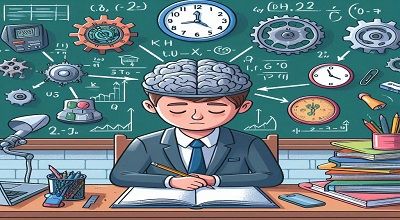Reduce the Cognitive Load on Students During Lessons
In this article, we are sharing How to Reduce the Cognitive Load on Students During Lessons. Reducing the cognitive load on students during lessons is essential for effective learning. Cognitive load refers to the mental effort required to process and understand information. Here are some strategies to help reduce cognitive load and enhance the learning experience for students:
Simplify Content:
- Break complex topics into smaller, more manageable chunks.
- Use clear and concise language, avoiding jargon or overly technical terms.
Prioritize Information:
- Highlight the most important concepts and key takeaways.
- Use visual aids, such as diagrams or charts, to emphasize critical points.
Chunk Information:
- Group related information together to help students process it more easily.
- Use headings, subheadings, and bullet points to organize content.
Provide Clear Instructions:
- Clearly explain the objectives and expectations for the lesson.
- Give step-by-step instructions for assignments or tasks.
Use Multimedia and Visuals:
- Incorporate visuals, like images, videos, or infographics, to aid comprehension.
- Ensure that visuals are relevant and enhance understanding.
Engage with Active Learning:
- Encourage student participation through discussions, problem-solving, and hands-on activities.
- Active learning helps students apply what they’ve learned, reinforcing their understanding.
Minimize Distractions:
- Create a conducive learning environment with minimal distractions.
- Avoid cluttered or busy presentation materials.
Offer Real-World Context:
- Relate the lesson to practical, real-world examples that students can easily grasp.
- Show the relevance of the material to their lives.
Use Technology Wisely:
- Leverage educational technology but avoid overwhelming students with too many tools or apps.
- Ensure that technology enhances learning, rather than complicating it.
Provide Frequent Feedback:
- Offer constructive feedback to help students correct errors and improve.
- Feedback should be specific, timely, and actionable.
Respect Cognitive Load Limits:
- Recognize that students have a limited cognitive capacity for processing information.
- Be mindful not to overload them with too much content in one lesson.
Use Metacognition:
- Encourage students to think about their own thinking (metacognition).
- Teach them strategies for managing their cognitive load, such as note-taking or summarization.
Adapt to Learning Styles:
- Recognize that different students have different learning preferences.
- Provide opportunities for visual, auditory, and kinesthetic learning.
Foster a Growth Mindset:
- Promote a growth mindset where students believe they can develop their abilities through effort and learning.
- This can reduce anxiety and improve engagement.
Promote Self-Regulation:
- Teach students how to manage their time and resources effectively.
- Help them develop study skills and strategies for organizing their learning.
Assess Learning Incrementally:
- Use formative assessments and quizzes to gauge understanding during the lesson.
- This allows you to make adjustments as needed.
Summary
Above here, Reduce the Cognitive Load on Students During Lessons. Remember that different subjects, grade levels, and student backgrounds may require different approaches to reduce cognitive load effectively. Continuously seek feedback from your students to adapt and refine your teaching methods for optimal learning outcomes.
